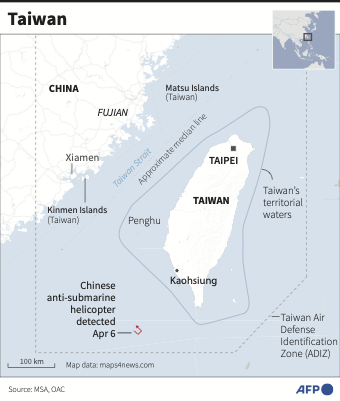China sent warships through waters around Taiwan on Thursday as it vowed a “resolute response” to the island’s president meeting US House Speaker Kevin McCarthy.
Taiwan leader Tsai Ing-wen held talks with McCarthy in Los Angeles on Wednesday, expressing gratitude afterwards for the meeting that she said showed her island was not isolated on the international stage.
China had repeatedly warned both sides the meeting should not take place, and deployed an aircraft carrier through waters near Taiwan hours before the talks went ahead.
Three additional warships were detected in waters separating the island from mainland China, Taiwan’s Ministry of National Defense said on Thursday morning.
An anti-submarine helicopter had also crossed the island air defense identification zone, according to the ministry.
Despite Taiwan having been ruled separately for more than 70 years, China views it as part of its territory and has vowed to one day seize it, by force if necessary.
China carried out its largest-ever air and sea exercises around Taiwan following a visit in August last year by McCarthy’s predecessor, Nancy Pelosi, to the island.

China deployed warships, missiles and fighter jets into the waters and skies around Taiwan in August.
Its response to the McCarthy meeting has so far been on a much lower level.
Tsai said in the United States she had received a warm welcome from politicians on both sides of the aisle.
“Their presence and unwavering support reassure the people of Taiwan that we are not isolated and we are not alone,” she told reporters at the Ronald Reagan Presidential Library in Simi Valley.
Tsai’s visit to California was technically a stop-over after a trip to Latin America to see two of Taiwan’s dwindling band of official diplomatic allies.
Hours after the Tsai-McCarthy meeting, China issued a strong rebuke.
“In response to the seriously erroneous acts of collusion between the United States and Taiwan, China will take resolute and effective measures to safeguard national sovereignty and territorial integrity,” China’s foreign ministry said.
However there were no initial signs of extra military activity on Thursday morning on Pingtan island in southeastern China — home to a People’s Liberation Army base and known as the closest point on the mainland to Taiwan.
AFP journalists on Pingtan last year had witnessed missile launches and army helicopters flying over the island following Pelosi’s visit.
McCarthy, who is second in line to the US presidency, said a shared belief in freedom and democracy underpinned a relationship that was “a matter of profound importance to the free world.”
He had originally planned to go himself, but opted instead to meet Tsai in California.
The decision was viewed as a compromise that would underscore support for Taiwan but avoid inflaming tensions with China.
McCarthy vowed US arms sales to Taiwan — which infuriate Chinese leadership — would continue, in what he said was a proven strategy to dissuade aggression.
“And what we know through history, the best way to do that is supply the weapons that allow people to deter war,” he said.
“It is a critical lesson that we learned through Ukraine, that the idea of just sanctions in the future is not going to stop somebody” who wants to wage war.
Despite having all the trappings of a fully functioning state, only a handful of countries acknowledge Taiwan as a sovereign nation.
Under a carefully constructed diplomatic fudge, the United States formally recognizes authoritarian Beijing, but is an important backer of Taiwan, and maintains strong unofficial and commercial ties.
Taipei enjoys bipartisan support in the US Congress, and has grown closer to Washington under Tsai’s leadership — much to China’s annoyance.
Pelosi on Wednesday praised the California meeting, which was attended by more than a dozen lawmakers, both Democrat and Republican.
“Today’s meeting between President Tsai of Taiwan and Speaker McCarthy is to be commended for its leadership, its bipartisan participation and its distinguished and historic venue,” she said.
Tsai times out as Taiwanese president in 2024, and her party is facing a challenge from opponents seen as closer to Beijing.
She has positioned herself as a defender of the status quo — de facto, but unspoken, independence, even as China poaches allies and pressures foreign governments to isolate Taipei.
“We once again find ourselves in a world where democracy is under threat and the urgency of keeping the beacon of freedom shining cannot be understated,” she told reporters.
“Taiwan is grateful to have the United States of America by all sides as we confront the unique challenges of our time.”















